ICI Assembly Discussed Export Supports and Export Financing
- 25.08.2021
- News
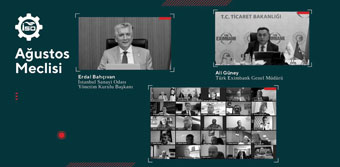
Istanbul Chamber of Commerce's (ICI) August Assembly was held on Wednesday, August 25, 2021 via video conferencing. The ICI Assembly's primary agenda was "Turk Eximbank's Vision for the Development and Sustainability of Quality and Value-Added Exports: Diversify the Supports It Offers," which was led by ICI Assembly's President Zeynep Bodur Okyay. Ali Güney, General Manager of Turk Eximbank, attended the meeting as a guest. Among the other attendees of the meeting were Mustafa Çağrı Altındağ, Assistant General Manager of Marketing at Turk Eximbank, Hakan Uzun, Assistant General Manager of Treasury/Finance, Tuğba Solak, Head of Insurance Operations, and Mehmet Efkan Bingöl, Head of Marketing Department.
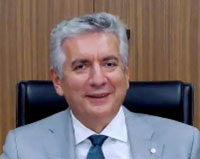
Erdal Bahçıvan, Chairman of ICI
ICI Chairman Erdal Bahçıvan told the Assembly that Türkiye has gained a significant opportunity with the transformation experienced in global supply chains during the pandemic and said: "It is a fact that production must continue without interruption in order for life to continue. However, during this period, our industry needs financial support for strong and sustainable exports. In this context, Turkish Eximbank should diversify its support for exports and the green economy by increasing next-generation funding sources.”
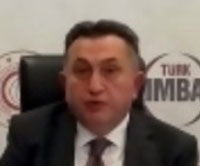
Ali Güney, General Manager
of Turkish Eximbank
Ali Güney, the General Manager of Turk Eximbank, said in his speech that he does not intend to boost profitability. "Our costs are appealing for the market, and our aim is to support the exporter” he said. Highlighting the great importance they attach to the support they give to SMEs, Ali Güney said: “In the first half of 2021, SMEs constitute 92 percent of the companies benefiting from bank loans for the first time. We can reach $300 billion in exports by increasing the support to SMEs."
The August Assembly Meeting was called to order by Zeynep Bodur Okyay, the President of the ICI Assembly. Okyay made evaluations about the agenda of the meeting:
"Urgent issues related to the climate crisis need to be addressed. Our sensitivity should be even greater than every other day. Our chamber also shares its views with the relevant circles. We are one step behind the world in terms of R&D, high technology, and innovation. The country has to come through and overcome this. Türkiye’s average value-added exports are around $1. Exports of the countries that set out in the same period are much higher. This is the only way we can overcome the chronic problems of the Turkish economy. In order to prevent any export disruptions and any adverse impact on exports, we would like to receive support from Turk Eximbank.”
After her speech, ICI Assembly President Okyay gave the floor to ICI’s Chairman Erdal Bahçıvan to talk on the agenda. "Türkiye has a significant opportunity to raise its share of global exports and reach higher ranks in the value chain thanks to the transformation experienced and predicted to continue in global supply chains after the Covid-19 outbreak" said Bahçvan. "The country's exports have gained a strong acceleration amid reopening of a substantial part of the world economies and the rebound in global trade.
“According to the export data released by the Ministry of Commerce, we can complete 2021 with an export of around 210 billion dollars. The industrial sector accounts for more than 95 percent of our country's exports. We are aware that we need much more investment to make our country more competitive with high value-added products. In fact, our industry entered the new period with a much higher investment motivation. The upward trend in machinery-equipment investments since the middle of last year is encouraging. Again, recent developments such as the recent acceleration of industrial production and the record high figure of 6 million 240 thousand in industrial employment in June, the largest number ever, indicate that our industry is on the cusp of a big breakthrough. It is a fact that production must continue uninterrupted in order for life to continue, no matter how the process takes shape in the future. However, during this period, our industry needs support for strong and sustainable exports. And the primary support is financing. In this context, Turkish Eximbank should diversify its support for exports and the green economy by increasing next-generation funding sources."
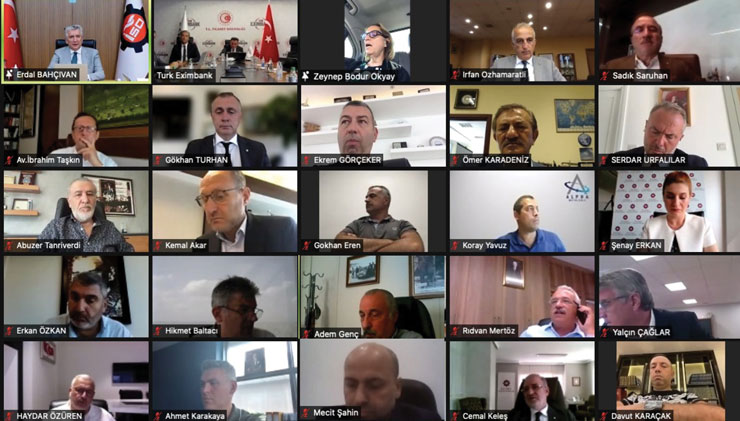
Bahçıvan pointed out that it is the wish of every industrialist to have easier and more affordable access to financing through bank loans in our country. “However, it is vital that our producers and exporters have alternative financing instruments and use non-credit instruments more in the long run” he said. “At this point, we see the vision and projects of Turkish Eximbank, the biggest supporter of our exporters and a friend of the real economy, as an important player supporting our competitiveness in the most difficult times.
“It is important to increase Turkish Eximbank's loan volume to support companies and exports with different instruments by developing new business models. With the existing capital of Turk Eximbank, it is not possible for them to really support our exports and exporters. For this reason, the capital of Turk Eximbank should be strengthened. Only 9 percent of the loans extended by Turkish Eximbank are in Turkish lira and no Turkish lira-based loan is extended to non-SMEs. Turkish Eximbank’s credit facilities in Turkish lira should be expanded and instruments should be developed to protect our companies against currency risks. On the other hand, the collateral costs incurred during the loan process constitute a significant financial burden for industrialists. While we applaud our Minister of Treasury and Finance, Mr. Lütfi Elvan's statement last week that the Credit Guarantee Fund (KGF) supported Eximbank Loan Package for SMEs with High Export Potential, we believe that this opportunity should be developed with a long-term perspective, not only for our SMEs, but also for all of our other companies, which are the sector's locomotive.”
Bahçıvan also emphasized the unfairness experienced by companies that have no problems with their credibility and fulfill their obligations on time but lose their KGF limits. Bahçıvan said: “Turk Eximbank should no longer be an institution just giving loans against collateral, but an institution evaluating and lending companies according to past performance criteria, as we have often brought to the agenda in the past. It will be very beneficial to limit excessive commissions and fees from letters of guarantee, which have become a source of complaint and cost in not only Eximbank loans but the entire banking system, to 1 percent in export-oriented letters in particular through a decision of BRSA. Again, Eximbank credit limits of exporter industrialists need to be raised in parallel with the export volume. In terms of the cash flow sustainability of our exporters, it is extremely important to have funds with long-term maturity. Considering that 76 percent of Turkish Eximbank’s domestic loan volume is currently short term, we believe that long-term funding opportunities should definitely be increased.
“Many remote market buyers, particularly the U.S., are looking for Turkish supplies as an alternative to Asia as a result of shifts in global trade chains. Rising freight prices, however, are a disadvantage. We find it important that Eximbank launches a program to export low-interest Turkish lira export loans to distant markets. A sector-based approach would be beneficial in the supports. The growing tendency of exports in the electronic environment in Türkiye due to the strong share of e-commerce in global exports, and the design of a special loan program for e-export companies may be a good example for the industry."
Erdal Bahçıvan also emphasized the significant contributions that Turk Eximbank made to exporters with the insurance instrument provided. “Despite the recent increase in raw material prices, the fact that the export insurance limits of the companies remain the same creates a bottleneck for our exporters" he said. "When a firm takes risk and exports goods above the Eximbank limit, Eximbank excludes the insurance amount it has determined in case of any adverse situation. Despite high demand, this is one of the biggest obstacles to exports. Therefore, we consider it important to increase the export insurance limits. Another important issue regarding insurance is the negative impact of long limit application periods on our exports. These periods should be shortened. Again, loosening the conditions for Turk Eximbank investment loans and allowing for more flexibility in the review process will help accelerate the implementation of investments and improve our exports."
He finally said: "It is very important that Turk Eximbank brings varied, high-quality, and sustainability-oriented financing resources to the country and functions as a bridge between industrialists and therefore, we invited Turk Eximbank to the ICI Sustainability Platform."
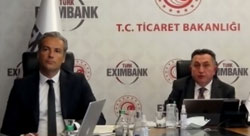
After Erdal Bahçıvan, Ali Güney, CEO of Turk Eximbank, made a speech at the ICI Assembly. Güney mentioned that Turk Eximbank has been working to offer supports to companies that export goods and services since 1987. "Turk Eximbank did not act with the reflex of a commercial bank while continuing its activities" said Güney. "On the contrary, we have a formation that cultivates its own profitability and allows all its resources to be used by exporters. Our costs are appealing compared to the market and our aim is to support the exporter.”
Ali Güney emphasized the great importance they attach to the support they give to SMEs: “In the first half of 2021, SMEs constitute 92 percent of the companies benefiting from bank loans for the first time. We can reach $300 billion in exports by increasing the support to SMEs."
Güney also emphasized the importance of credit insurance and shared some data about the subject: "According to TurkStat data, 62 percent of our exporters in 2019 do not have more than one or two buyers. We eliminate collection risks with the credit insurance support. We have structured the insurance unit as a non-Turkish Eximbank affiliate. We also launched our new insurance software. The pandemic period has strengthened the insurance perception. We have achieved 42 percent growth in insurance. Our target is to reach a volume of 22 billion insurance by the end of the year. This means a 50 percent growth compared to last year."
Güney also reminded that they increased their limits, not restricted, like other Eximbanks in the world during the pandemic process: "As a result of this, we had new costs that need to be charged, but as Turk Eximbank, but we had to absorb these losses. Türkiye's largest bank in the credit insurance segment of Turkish Eximbank is eighth in terms of loan volume and ninth in terms of asset size.
“We provided $45.6 billion in support to exporter companies in 2020 and 13,102 companies were benefiting from the support provided by Turk Eximbank. According to 2019 data, the top 1000 exporter companies made 72.6% of the total exports. In order to achieve high targets in exports, we should reduce this concentration and enable SMEs to export more.”
Güney listed the services provided by Turk Eximbank as exporter loans, buyer loans, insurance and derivative products. "We have launched new products such as foreign letter of guarantee program, loan program based on the collateral of the insured credit, participation financing investment credit and service insurance."
Güney stated that despite Türkiye's problem of resources, Turk Eximbank was able to use the resources of the Central Bank. "In the study we made, we identified the competitive and high value-added industries in Türkiye and will prioritize the use of resources by analyzing which company produces which products. For enterprises who are fully exporters, we will make an ‘export score calculation’, which will be one of the primary parameters in terms of credit limit."
Afterwards, the members of the ICI Assembly took the floor to express their views on the main agenda item. The questions of the Assembly members were answered by Ali Güney, CEO of Turk Eximbank.